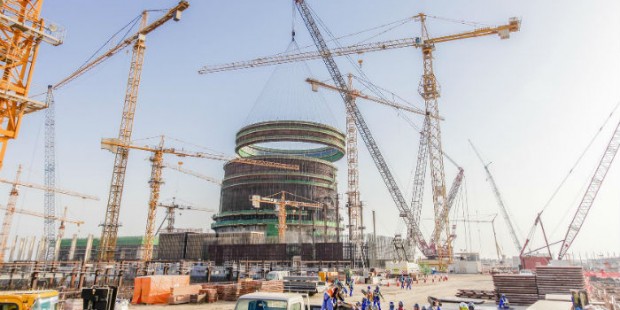UAE Says Nuclear Energy Programme Progressing “On Schedule”
By admin Wednesday, 07 January 2015 5:44 PM

The UAE’s nuclear energy programme is progressing on track to begin operations in 2017, the Emirates Nuclear Energy Corporation (ENEC) said on Tuesday.
The first unit of the $20 billion Barakah project – which includes four reactors in total – is now more than 60 per cent complete and on track to commence commercial operations in 2017, pending further regulatory approvals, ENEC said.
“We remain confident and committed to successfully delivering our mission of safe, clean, reliable and efficient nuclear energy to the UAE in 2017,” said Mohamed Al Hammadi, CEO of ENEC.
ENEC has completed the construction of the concrete dome for the Unit 1 Reactor Containment Building (RCB), it said in a statement. The dome is the final structural component of the RCB, which now measures more than 70 metres in height.
“The RCB is a critical structure in the plant’s safety and security. The construction of this structure has involved thousands of people,” said Hammadi.
The RCB houses the nuclear reactor and is a key structure in the nuclear plant’s defence-in-depth barriers. RCBs are robust in design, with thick concrete walls and heavy reinforcing steel and are designed to confine and contain radiation, even in the most extreme circumstances, the statement explained.
Construction of the RCB began in July 2012 with the fabrication of the basement. The Containment Liner Plate, which forms the inner floor, wall and ceiling of the RCB, was then fabricated and installed in 19 stages over a period of 10 months, ENEC stated.
The dome, which measures 51.4 metres in diameter, 24 meters in height and weighs approximately 9000 metric tonnes, has been constructed over the past five months in nine stages.
The next phase of work on the RCB will involve the installation of the containment post tensioning system, which is used for pre-stressing the concrete structure, followed by a three-month structural integrity test.
Construction on the second unit is also underway, and it is scheduled to begin operations in 2018, with Unit 3 and Unit 4 set to start functioning in 2019 and 2020 respectively.
A consortium led by the Korean Electric Power Company (KEPCO) is carrying out all the construction work.
When the four reactors are completed in 2020, the UAE’s nuclear programme will provide approximately 25 per cent of the country’s electricity needs, saving up to 12 million tons of greenhouse gas emissions each year, ENEC said.
The country’s nuclear energy programme is expected to generate electricity at one-third the cost of traditional oil fired power plants.




























Add new comment